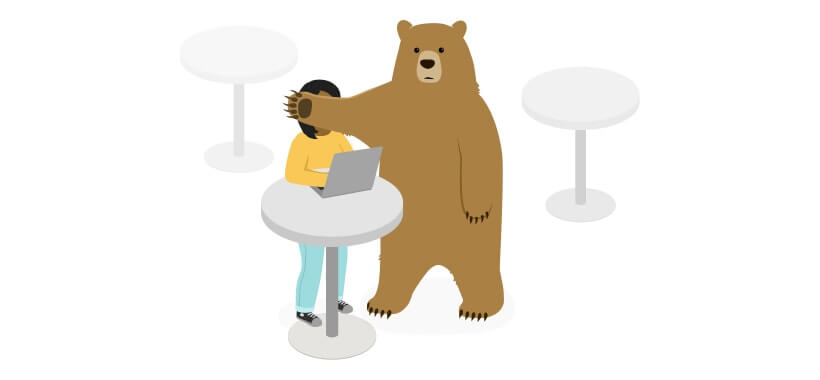Apart from its solid encryption package, TunnelBear boasts a pretty impressive list of security featuresGeo-spoofing your favorite streaming platforms and preventing ISPs from throttling your connection are nice bonuses offered by all major VPN providers, but measures that protect your online privacy and keep you safe from potential attacks are the most important aspects of modern VPN services.
A respectable VPN software needs to scramble your data with an unbreakable layer of encryption, prevent your DNS requests from leaking out, implement a reasonable logging policy, and protect you during your torrenting sessions.
With this in mind, read this comprehensive analysis to see if TunnelBear VPN has what it takes to keep you out of harm’s way during your online sessions and maintain an unsurmountable gap between your true identity and your online activities.

Logging Policy
TunnelBear collects minimum information required to provide its service, process payments, prevent fraud, and monitor data usage on free accounts. The recorded data includes:
- Account user data – Email address and your Twitter ID if you decide to tweet about TunnelBear for extra traffic.
- Operational data – Total data used per month, OS version, TunnelBear app version, operational events, and whether you have been active this month.
- Financial data – Information given to the payment processor once you make a purchase. You can bypass this data collection by using Bitcoin. If you opt for your credit card, TunnelBear will record your last name, last 4 digits of your credit card number, date of card use, card billing address, and expiry. To prevent credit card fraud, TunnelBear will also collect your session information (device type, OS, and your IP address at the time of payment).
- Cookies – TunnelBear uses different sets of cookies for its “regular” and team software and you can find a comprehensive list on the official website.
Apart from the cases listed in the privacy policy, TunnelBear will never share your personal information or sell it to third parties. You can inspect, amend, correct, and delete your data at any given moment.
Bottom line, TunnelBear does NOT keep any activity logs, including the sites you visit, your IP address, used applications, and other information that can be used to connect you as an individual with your online traffic. In other words, even if the authorities serve the company a warrant, they will receive nothing of use.
VPN Encryption
First of all, TunnelBear’s no logs policy is pretty strict. It means the app does not monitor and store user activity.
This claim comes with a caveat, however. Since TunnelBear is based in Canada, the Five Eyes Alliance has to be mentioned. The privacy policy states that by using the service, you agree to your info being used according to the laws of Canada. Five Eyes is an international spy network, highly secretive and notorious for spying on citizens and operating above the law. Its members (USA, UK, Canada, Australia, and New Zealand) can share the gathered information, so you can draw your own conclusions.
TunnelBear operates with two different protocols. IPSec/IKEv2 is the optimal option for iOS devices while MAC OS X, Android, and Windows use OpenVPN.
Except for iOS 8 and versions preceding it, a sturdy 256-bit AES encryption is used across all the platforms. SHA256 is used for authentication. IOS is encrypted with 128-bit AES and utilizes SHA-1 for authenticating data.
Apart from its solid encryption package, TunnelBear boasts a pretty impressive list of security features

- Vigilant – This feature addresses the seconds-long moments while TunnelBear connects or reconnects in case of a WI-FI hiccup. This feature is currently available on Windows and Mac OS.
- Always on – TunnelBear will start when you turn on your computer and stay connected until your session is done. You do not have to ever worry about “flipping the switch” after the initial setup during installation.
- Ghost – This is a proprietary version of the so-called “stealth protocol” used to ensure better performance and protection in countries with higher levels of online censorship (China, for example).
Besides these security-oriented options, TunnelBear also auto-tunnels to the “nearest” server available. By nearest, we mean the one with the lowest ping. This ensures the shortest possible distance for data travel. You can also choose the server on your own.
P2P
Ever since its inception, TunnelBear wanted nothing to do with torrenting and its policy in that regard was a resounding NO. However, the company has apparently changed its mind recently and started allowing P2P filesharing on its servers. Having said that, the Canadian law on copyright infringement is pretty clear in its intention to put a stop to this practice once and for all. Therefore, the representatives of TunnelBear VPN warn its users against any illegal downloads.
Even though the company finally started exploiting some loopholes in Canada’s Copyright Act, we still would not deem it completely safe to download any copyrighted content. On top of this, the official stance of TunnelBear sounds more like “we do not care” rather than “it is allowed.”
If torrenting is your primary reason for purchasing a VPN, however, check out our list of the best torrenting services currently out there. The list is regularly updated in order to reflect the real market situation at all times.

DNS Leaks
Our team did not experience any IP or DNS leaks during our testing circuit. The tools we used were only able to detect our assigned IP address and DNS servers provided by TunnelBear. Therefore, you do not have to worry about your real IP or location leaking out and leaving you vulnerable and exposed. In other words, neither your ISP nor the government will ever be able to interfere with your online traffic and monitor your activities.
Conclusion
After the long answer comes the short one. Yes, TunnelBear is a highly reliable and secure VPN.
It utilizes heavy encryption, stays on while your computer is running, and is pretty easy to use. It does not keep logs of your online activity and has a “kill switch” in case it ever loses connection for one reason or the other.
The Five Eyes danger can generally be pinned to any VPN provider based in one of the associated countries, so you just have to weigh the pros against the cons on that one.